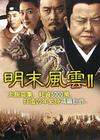Who will dominate the Central Plains in the风云2 of the late Ming Dynasty?
In the year of Chongzhen's ascension to the throne, he inherited from Ming Xizong a Ming Dynasty riddled with problems. At the time, powerful minister Wei Zhongxian had sole control over the administration, rendering Chongzhen effectively a puppet emperor as all edicts were issued by Wei Zhongxian. However, Chongzhen was not an incompetent ruler; he adopted a strategy of concealing his ambitions and playing along with Wei Zhongxian while secretly nurturing capable talents. Once his political base was solidified, he methodically eliminated the Ke-Wei faction led by Lady Ke and Wei Zhongxian in a clean and efficient manner. His political acumen and administrative capabilities could be compared to Emperor Kangxi’s skillful overthrow of Oboi. Diligent and self-disciplined, Chongzhen surpassed many emperors in history in terms of hard work and competence. However, the fate of the Ming dynasty was already sealed. It fell upon Chongzhen to face this inevitable dynastic change. His tragic destiny lay in the fact that not only was he unable to single-handedly prevent the collapse of the state, but history also did not afford him enough time or space to become a revivalist leader. In the year Li Zicheng led the peasant army to capture Beijing, Emperor Chongzhen hanged himself on Meishan Mountain, marking the fall of the Ming dynasty. After entering Beijing, Li Zicheng sent Tang Tong, a surrendered general, with ten thousand taels of silver and a letter from Wu Xiang, father of Wu Sangui, to persuade Wu Sangui to surrender. Initially inclined to submit to Li Zicheng to protect his property and status in Beijing, Wu Sangui changed his mind after hearing that his beloved concubine Chen Yuanyuan had been taken by Li Zicheng. Enraged for love, Wu Sangui immediately executed Li Zicheng's envoy and wrote to Prince Dorgon of the Qing dynasty requesting joint military action against Li Zicheng, aligning perfectly with the Qing army's ambition to enter the pass and dominate Central Plains. Dorgon promptly led the Qing troops through the pass to assist Wu Sangui in suppressing Li Zicheng. After the battle near Shanhaiguan at Yipianshi, where the Qing cavalry overwhelmed the peasant army from the right flank causing them to scatter, the entire Qing army entered the pass. Li Zicheng returned to Beijing, held a coronation ceremony in the imperial palace, accepted officials' homage, and then withdrew towards Xi'an the next morning. The question remained: which of the three emperors would rule Central Plains?




